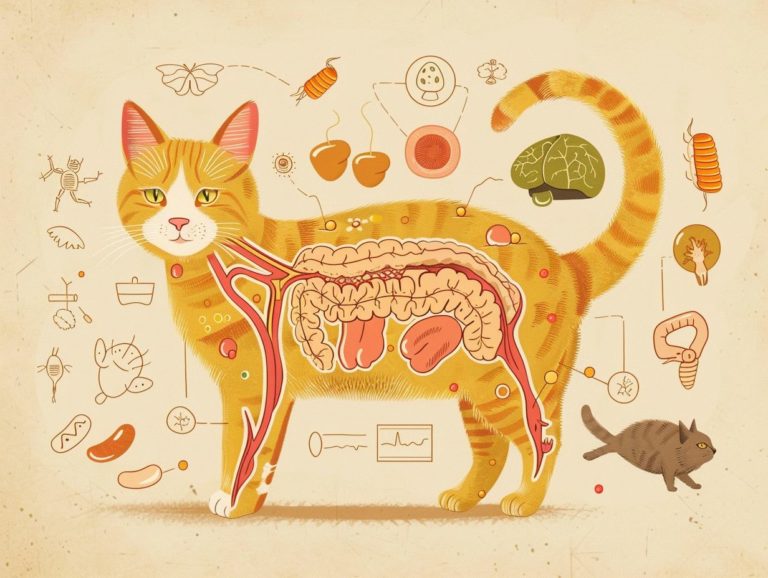Dealing With Digestive Issues In Cats A Comprehensive Guide
Cat owners may encounter digestive issues with their pets at any time. This guide addresses the common causes and symptoms of digestive problems in cats. It also provides information on the tests and examinations typically employed to diagnose such issues, along with the medications and therapies utilized for treatment.
Furthermore, it discusses dietary and lifestyle adjustments that can aid in preventing digestive problems in cats, as well as natural remedies and home treatments that can enhance the well-being of a cat’s digestive system.
Key Takeaways:
Understanding Digestive Issues in Cats
Understanding digestive issues in cats involves recognizing and addressing the wide variety of gastrointestinal problems that can affect cats. These issues manifest as symptoms like vomiting, diarrhea, and constipation, which can significantly impact their overall health and well-being.
Frequent vomiting in cats might indicate underlying problems such as food intolerance, infections, or pancreatitis. Constant diarrhea can be a sign of parasites, inflammatory bowel disease, or dietary indiscretion. Constipation in cats is sometimes a symptom of dehydration, blockages, or underlying medical conditions.
These digestive problems cause discomfort and also affect a cat’s energy levels, appetite, and behavior. Monitoring these symptoms and seeking prompt veterinary care is essential to prevent further complications and ensure the well-being of your feline companion.
Common Causes and Symptoms
Common causes and symptoms of digestive issues in cats can stem from a wide range of factors, including dietary indiscretion, stress, infections, and inflammatory conditions. Vomiting, diarrhea, and constipation are the primary symptoms associated with digestive problems in cats, often signaling underlying conditions that necessitate treatment.
Other prevalent causes of digestive issues in cats encompass food allergies, intestinal parasites, and pancreatic disorders, which may manifest as bloating, weight loss, and alterations in appetite. Stress, abrupt dietary changes, and bacterial overgrowth in the gut can also contribute to digestive disturbances in cats.
Early identification of these issues is crucial, as delayed treatment can worsen the situation and lead to more severe complications.
Diagnosing Digestive Issues in Cats
Diagnosing digestive issues in cats requires a comprehensive evaluation by licensed veterinarians to identify the underlying cause of gastrointestinal disturbances. A vet visit is essential to conduct diagnostic tests and physical examinations to determine the nature of the issue.
During the vet visit, the veterinarian may gather a detailed medical history of the cat, including any diet and behavior changes. This will be followed by a physical examination to assess for signs of discomfort or abnormalities in the abdomen. The veterinarian may then recommend additional tests such as blood work, fecal analysis, and imaging studies like X-rays or ultrasounds to gain a more detailed understanding of the potential causes of the digestive issues.
Timely diagnosis is crucial for prompt treatment and the prevention of further complications, ultimately enhancing the cat’s quality of life.
Key Tests and Examinations
Key tests and examinations for diagnosing digestive issues in cats include GI tract imaging, blood tests, fecal analysis, and ultrasounds. These diagnostic procedures assist in identifying conditions that impact the functioning or structure of the gastrointestinal tract, such as intestinal blockages or abnormalities within the digestive system.
GI tract imaging, including X-rays or contrast studies, enables veterinarians to visualize the internal structures of the gastrointestinal tract, aiding in the detection of any obstructions or abnormalities. Blood tests are essential for evaluating organ function and detecting signs of infection or inflammation. Fecal analysis is utilized to identify parasites, bacteria, or other pathogens that may cause digestive disturbances. Ultrasounds enable veterinarians to obtain detailed imagery of organs such as the liver, pancreas, and intestines, assisting them in assessing their size, shape, and overall health.
Treating Digestive Issues in Cats
The treatment of digestive issues in cats encompasses a comprehensive range of care, involving tailored treatment plans specifically crafted to address the underlying conditions contributing to gastrointestinal problems in felines. This comprehensive approach may involve the administration of medications, dietary modifications, and therapies aimed at managing a variety of conditions from infections to cancer.
Various medications, such as antibiotics, anti-diarrheals, and probiotics, are utilized to address digestive health issues in cats by targeting bacterial imbalances and alleviating symptoms. Dietary interventions play a crucial role in managing cats with digestive problems, with specialized diets low in fat or rich in easily digestible proteins often recommended to alleviate gastrointestinal discomfort.
In cases where conditions like cancer are the root cause of digestive issues in cats, targeted treatments like chemotherapy or surgery may be employed. Due to the unique needs of each cat, individualized care is essential, necessitating close monitoring and frequent adjustments to ensure a successful treatment outcome.
Medications and Therapies
Medications and therapies play a crucial role in treating digestive issues in cats caused by infections, toxins, and other underlying conditions. Prescription medications, probiotics, and supportive care are utilized to address gastrointestinal disturbances and effectively treat these underlying conditions in felines.
When bacterial infections are the root cause of the cat’s digestive problems, prescription medications such as antibiotics are prescribed to aid in the recovery process. Probiotics are also beneficial as they help restore the balance of healthy gut bacteria, promoting the overall health of the gastrointestinal tract.
Dietary changes and consistent supportive care are essential components of successful treatment in addition to medication, and adherence to the veterinarian’s treatment plan is vital for achieving positive outcomes.
Preventing Digestive Issues in Cats
To prevent digestive issues in cats, it is important to proactively maintain their gastrointestinal health and overall well-being by following key preventive strategies. For cats with diarrhea, constipation, or other GI issues, ensuring access to fresh and clean water at all times can help prevent dehydration, which is a common cause of digestive problems. Regular grooming can assist in controlling hairballs and preventing blockages in the digestive tract, reducing the risk of ingesting loose fur that could cause complications in the stomach or intestines.
Feeding a high-quality, balanced diet rich in fiber and scheduling regular fecal exams to check for worms and parasites are also essential preventive measures. Additionally, limiting exposure to stressful situations, regular exercise, and consistent feeding schedules can contribute to your cat’s overall digestive health.
Diet and Lifestyle Changes
Making dietary and lifestyle changes are the most crucial factors in preventing digestive issues in cats. Implementing dietary adjustments, managing stress, and making lifestyle modifications can significantly impact the gastrointestinal health of cats. Introducing hairball control diets and minimizing environmental stressors are effective preventive strategies.
Tailoring diets to address the digestive sensitivities of individual cats can play a key role in reducing symptoms like diarrhea or vomiting. Stress reduction techniques, such as interactive play sessions, calming pheromone diffusers, and providing cozy hiding spots, can help lower cortisol levels and promote a healthier gut.
It is important to gradually transition cats to new foods to prevent digestive upset, while enriching their environment with scratching posts, climbing trees, and puzzle feeders can help reduce anxiety and enhance overall health.
Home Remedies for Digestive Issues in Cats
Home Remedies for Digestive Issues in Cats are natural and homemade treatments that provide relief from mild gastrointestinal issues and can be used in conjunction with prescribed veterinary care. Probiotics, such as FortiFlora and other vet-approved options, help restore the balance of good bacteria in the gut, promoting healthy digestion in cats. Herbal supplements like slippery elm, chamomile tea, or ginger may have a calming effect on the stomach.
Dietary changes, such as increasing fiber intake or switching to a sensitive stomach formula, can help alleviate digestive discomfort. In cases of non-chronic issues, a brief fasting period can offer temporary relief, ensuring the cat has access to ample water. Opting for non-toxic, pet-safe products can prevent further digestive upset. Hairball medications like Laxatone act as laxatives and lubricants to help cats expel hairballs causing gastrointestinal distress, available without a prescription.
Feliway stress-reducing products can help manage anxiety and stress that may contribute to digestive problems in cats. However, these remedies should complement, not replace, veterinary care, and consulting a veterinarian is essential if a cat exhibits signs of digestive difficulty.
Natural Treatments and Homemade Solutions
Methods for treating cat digestive problems focus on reducing symptoms of common gastrointestinal illnesses or diseases in cats such as pancreatitis and dietary sensitivities through natural treatments and homemade solutions. These approaches often incorporate Dutch home remedies and the use of herbal supplements to promote feline gastrointestinal health.
The utilization of Dutch herbal remedies is increasingly being explored for their potential benefits in supporting feline digestive health. Traditional Dutch home remedies such as chamomile tea and ginger root can offer soothing effects to settle an upset stomach or enhance healthy digestion. Adding probiotics to a cat’s daily diet can help maintain a stable and healthy balance of gut bacteria, crucial for proper digestion.
Homemade bone broth is another recommended option, as it is easily digestible and provides essential nutrients for a cat’s digestive system.
Frequently Asked Questions
What are some common signs of digestive issues in cats?
Some common signs of digestive issues in cats include vomiting, diarrhea, constipation, loss of appetite, and bloating.
What should I do if my cat is experiencing digestive issues?
If your cat is experiencing digestive issues, it is important to consult with your veterinarian for a proper diagnosis and treatment plan. They may also recommend changes to your cat’s diet or lifestyle.
What types of digestive issues can cats experience?
Cats can experience a variety of digestive issues including inflammatory bowel disease, food allergies, pancreatitis, and intestinal parasites.
How can I prevent digestive issues in my cat?
To prevent digestive issues in your cat, make sure to provide them with a balanced and high-quality diet, keep them hydrated, and ensure they are getting enough exercise. It is also important to regularly deworm your cat and keep them up-to-date on vaccinations.
Should I give my cat any supplements for digestive health?
Before giving your cat any supplements, it is best to consult with your veterinarian. Some cats may benefit from probiotics or digestive enzymes, but it is important to use them under the guidance of a professional.
Are there any home remedies for dealing with digestive issues in cats?
While there are some natural remedies that may help with digestive issues in cats, it is important to consult with your veterinarian before trying any at-home treatments. They can provide the best advice tailored to your cat’s specific needs and condition.

